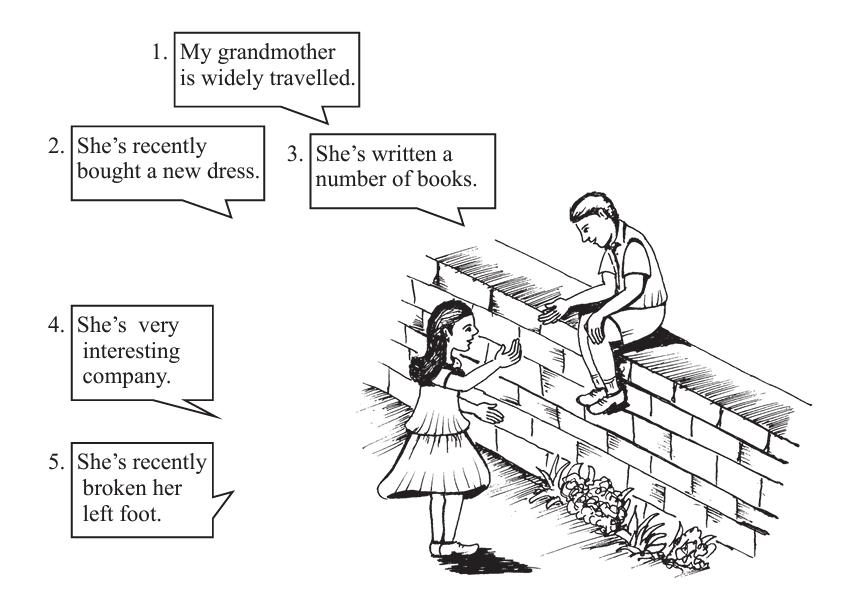“Azad : The Martyr” is a lesson of Class 8 Textbook of MPBSE. Here all the Exercises Questions are done by teachers.
A. The letters in the following words are jumbled. Rearrange them to make meaningful words.
- seepac → escape
- otmner → mentor
- lpdgee → pledge
- tnerad → ardent
- lyrea → early
- rsetpi → priest
- uregcao → courage
- rretor → terror
B. Make antonyms of the following words by using the prefix ‘dis’:
- courage → discourage
- agree → disagree
- appear → disappear
- comfort → discomfort
- able → disable
- connect → disconnect
Now complete the following sentences using the correct form of the words from the box:
- His father disagreed to his joining politics.
- The mice disappeared as soon as they saw the cat.
- Meghna was disappointed to see her marks in English.
- He was disabled after the car accident.
- They disconnected the phone because people were misusing it.
- One should not discourage the children.
- Although he comes from a royal family, he put up with all the discomforts.
C. Use the following pair of words in sentences to show the difference in their meanings as given in the example.
- sun, son
- The sun rises in the east.
- His son is very intelligent.
- wait, weight
- Please wait for me at the bus stop.
- The weight of the box is too heavy to lift.
- pray, prey
- We pray to God every morning.
- The lion hunted its prey in the jungle.
- hair, hare
- She has long, beautiful hair.
- A hare is faster than a tortoise.
- new, knew
- I bought a new dress yesterday.
- She knew the answer to the question.
- see, sea
- I want to see a movie this weekend.
- The sea looks beautiful at sunset.
- hear, here
- Can you hear the sound of the birds?
- Please come here and sit with me.
Comprehension
a. When and where was Chandra Shekhar born?
Chandra Shekhar was born on 23rd July 1906 in the village of Bhabra, Jhabua district, Madhya Pradesh.
b. Where did he receive his early education?
He received his early education in Bhabra.
c. What attracted Chandra Shekhar?
Chandra Shekhar was attracted to the national upsurge of the nonviolent non-cooperation movement of 1920-21 under Mahatma Gandhi’s leadership.
d. One of Chandra Shekhar’s statements provoked the magistrate. What was that statement?
He gave his name as “Azad,” his father’s name as “Swatantra,” and his residence as “Prison,” which provoked the magistrate.
e. What were the revolutionary acts of Chandra Shekhar?
Chandra Shekhar participated in revolutionary activities such as the Kakori Case, mentored Bhagat Singh, and fought for India’s independence against British rule.
f. How did Chandra Shekhar prove his name Azad?
Chandra Shekhar proved his name “Azad” by shooting himself at Azad Park to avoid being captured alive by the British police, fulfilling his pledge.
The image outlines examples of Reported Speech where the statements of Asha (the first speaker) are converted by Mohan (questioner) and then reported by Radha (reporter). Here’s a summary of how the sentences are structured:
Observations:
- Direct Speech (Asha’s exact words):
- Asha says exactly what she feels or wants, e.g.:
- “I don’t want to play today.”
- “I would like to see an aeroplane.”
- “I am buying this pair of jeans.”
- Asha says exactly what she feels or wants, e.g.:
- Question by Mohan (Interrogative form):
- Mohan asks:
- “What did she say?”
- Mohan asks:
- Indirect Speech (Reported by Radha):
- Radha reports Asha’s statement in an indirect way, ensuring:
- The tense changes appropriately.
- Time references, pronouns, and words like “this” or “today” are adjusted.
- Examples:
- Asha’s statement: “I don’t want to play today.”
Radha reports: “She said that she didn’t want to play that day.” - Asha’s statement: “I would like to see an aeroplane.”
Radha reports: “She said that she would like to see an aeroplane.” - Asha’s statement: “I am buying this pair of jeans.”
Radha reports: “She said that she was buying that pair of jeans.”
- Asha’s statement: “I don’t want to play today.”
- Radha reports Asha’s statement in an indirect way, ensuring:
Key Points:
- Tense Changes:
- Present → Past (e.g., “I am” → “she was”).
- Future → Conditional (e.g., “I would like” → “she would like”).
- Pronouns Adjusted:
- First-person changes to third-person (e.g., “I” → “she”).
- Time and Place Words Adjusted:
- “Today” becomes “that day.”
- “This” becomes “that.”
Exercise – Reported Speech
You meet Manuja, and she tells you about her grandmother. Report what Manuja told you to your friend Anil.

- She told that her grandmother was widely travelled.
- She told that her grandmother had recently bought a new dress.
- She told that her grandmother had written a number of books.
- She told that her grandmother was very interesting company.
- She told that her grandmother had recently broken her left foot.
